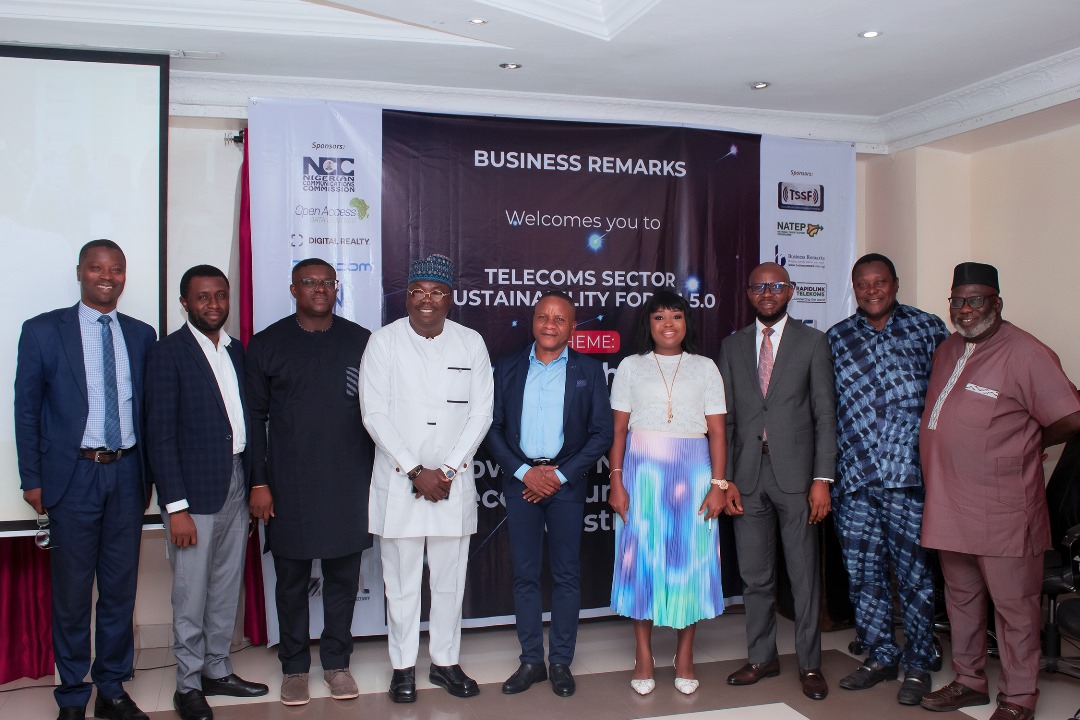Telecom
Experts Call for Talent Management Systems to Mitigate Talent Exodus in the Telecom Industry

Experts in the telecommunications industry have called for the introduction and integration of a Talent Management System to help mitigate the effects of talent exodus in Nigeria.

For years, various sectors of the Nigerian economy have struggled with brain drain, as highly skilled professionals continuously leave the country in search of better opportunities abroad, overwhelming the available workforce.
The telecommunications industry has not been spared, with numerous reports of high rates of talent resignation and migration to other countries.
This situation has impacted the sector, though some argue it presents an opportunity to evolve and integrate more talent into the pipeline.
During a panel session moderated by WTES Project Chief Operating Officer, Mr Chidi Ajuzie at the recently concluded 5th edition of the Telecom Sector Sustainability Forum (TSSF 5.0), organized by Business Remarks, the experts discussed the theme: “Mitigating the Effect of Talent Exodus on Nigeria’s Telecom Growth.” They acknowledged the issue of talent exodus but viewed it more as an opportunity than a threat.
Engr Ikechukwu Nnamani, ceo of Digital Realty, emphasized the need for a structured process for training and retraining talents already in the system, particularly by leveraging Nigeria’s large population to ensure talent retention.
Nnamani stated, “It’s inevitable. However, we should focus on the benefits. Reviewing employment policies to make workflows more flexible and adaptable for employees can reduce the impact of talent loss.”
He also noted that unlike other sectors, the data centre subsector has not experienced a significant loss of talent.
Delivering his paper presentation, the (NATEP), Femi Adeluyi speaking on the sub topic “Government Policies and Industry Initiatives to Retain and Attract ICT Professionals” addressed that talent export also has its advantages to its host community.
Citing India as an example, he said there needs to be a balance.
Dr. Olufemi also stressed the necessity of motivating employees through better remuneration and by creating mentorship programs.
He urged companies to implement a Talent Management System to effectively manage talent while simultaneously growing their businesses.
John Nwachukwu, managing director of Zoracom, stressed the importance of retention plans for businesses to hold onto talent, noting that companies must provide a supportive and enabling work environment.
He highlighted the need for succession and retention plans to prepare for talent loss and to create a vibrant and conducive workforce environment.
In the same vein, the CEO of Infratel, Dr. Tola Yusuf also encouraged businesses to focus on the positive aspects, advocating for continuous staff training and retraining to improve retention, alongside creating an atmosphere of encouragement for employees.
Speaking on this, the CEO of Jidaw System, Engr Jide Awe, highlighted India’s successful experience with talent export as a model for other countries.
According to him, India’s long-standing strategy of promoting software development and encouraging its citizens to pursue careers abroad has led to significant technological advancements and economic growth.
“By fostering a culture of innovation and entrepreneurship, India has not only benefited from the expertise and skills gained by its citizens working overseas, which has led to the establishment of a strong technology sector but has also attracted foreign investment and created job opportunities within the country.
“This demonstrates the potential for talent export to be a mutually beneficial strategy for both exporting and host countries, ” he noted.
Ms. Tinuade Oguntuyi who represented ICSL CEO, Yemi Oshodi is of the view that emphasized that brain drain and talent exodus in the telecom sector have a significant impact, not only on the industry itself but also on individuals and the broader economy.
According to her, brain drain in the telecom sector can have far-reaching consequences, including disruptions in services and a decline in innovation.
She also stressed the need to invest in talent development and create a conducive environment to retain skilled professionals within Nigeria.
On his part, the CEO of Impulso Integrated Services, Mr Akinyele Oludare said that the current talent exodus in the telecom sector is a result of various factors, including the slowing growth of the industry, limited opportunities for advancement, and the allure of higher earnings abroad.
While this trend can have negative consequences for the sector, the speaker also noted that it can have positive effects, such as increased remittances to Nigeria.
The speaker suggested that to address the talent exodus, the telecom industry needs to create a more attractive and dynamic environment for professionals.
This includes investing in growth, providing opportunities for advancement, and offering competitive compensation packages. By doing so, the industry can incentivize talented individuals to stay in Nigeria and contribute to its development.
The experts, however, cautioned companies against halting employee training programs out of fear of talent loss, emphasizing that the potential negative impact on company growth and success far outweighs any perceived benefits. Nigeria loses billions of dollars annually due to talent migration.
TSSF 5.0 aims to foster dialogue and develop strategies to retain talent while promoting sector growth. By bringing together key stakeholders, the event hopes to contribute to effective policies and initiatives that will enhance talent retention in the telecommunications industry.
Speaking about the event, the convener of the forum and Managing Editor of Business Remarks, Bukola Olanrewaju, noted that the Nigerian telecom sector is currently grappling with a multitude of challenges.
Olanrewaju stressed that the escalating depletion of talent and skilled workforce in critical sectors of the Nigerian economy is a pressing concern.
“This loss of human capital could pose as a significant threat to the nation’s productivity and economic growth if there is no balance.”
Telecom
FG Expands 3MTT Programme Across the Country

Dr Bosun Tijani, Nigeria’s minister of communications, innovation, and digital economy, has revealed that the federal government’s 3 Million Technical Talent (3MTT) programme has trained over 135,000 citizens as it moves from pilot to national level.

Tijani announced this in an update on the program’s success, stating that the beneficiaries were trained in three batches.
He also stated that the initiative’s community-based learning tools had provided over 300,000 extra learners with access to digital skills training across the country.
According to the minister, the program has also enabled the creation of about 15,000 job, entrepreneurship, and career development in Nigeria’s developing digital economy.
He further revealed that more than 1.8 million Nigerians are currently in the 3MTT pipeline, as the government works toward its target of equipping three million citizens with in-demand digital skills aligned with local and global labour market needs.
As the programme enters its scale-up phase, Tijani said the government’s focus will shift toward deepening impact rather than just expanding numbers.
Key priorities, he explained, include strengthening the 3MTT alumni community, widening access to economic opportunities and ensuring that skills acquired through the programme translate into measurable outcomes such as jobs, business creation and innovation.
To support this phase, the federal government has introduced the #3MTTImpactChallenge, an initiative aimed at assessing the programme’s real-world impact
Through the challenge, fellows and partners are invited to share personal stories on how 3MTT has shaped their professional journeys as part of a National Impact Reflection exercise.
Participants are expected to share their experiences across social media platforms, with selected winners set to receive prizes including laptops, e-tablets, data bundles and other incentives.
Telecom
MTN Foundation Trains 2,000+ Young Nigerians in ICT for SME Growth

MTN Foundation has kicked off the seventh phase of its ICT business skills training programme, targeting more than 2,000 entrepreneurs, mostly from Nigeria’s small and medium-scale enterprises (SMEs), in support of the Federal Government’s National Digital Economy and SME Development agenda.

MTN Foundation
The virtual training’s first week ran from Monday, January 5, to Friday, January 9, 2026. It equips small business owners and aspiring entrepreneurs with simple digital tools to shift from paper-based operations to efficient, productivity-boosting systems.
Business analyst Babajide Jolaolu-Kehinde, moderated by Temiloluwa Oyekanmi, programme and partnerships lead, introduced the SWOT framework—Strengths, Weaknesses, Opportunities, and Threats—to guide participants in assessing and improving their businesses.
Jolaolu-Kehinde stressed digital record-keeping, online payments, and customer data tracking for measurable growth, aligning with government efforts to formalise SMEs. “Hope is good, but action and systems make growth happen,” he said.
Trainers showcased real-world examples: traders using handwritten ledgers expanded reach via WhatsApp Business, online marketplaces, and spreadsheets; others grew by accepting mobile transfers over cash and digital orders to tap distant markets.
Manual operations limit sales visibility and customer insights, experts noted, while digital tools deliver real-time data, cut errors, and unlock broader markets.
Participants must adopt at least one digital tool post-onboarding, with organisers promising follow-up workshops and mentorship. The four-week programme aims to bolster SME growth and Nigeria’s economic goals.
Telecom
Spacecoin Secures Licenses to Roll Out Satellite Connectivity in Nigeria, Kenya

Spacecoin, US-based, has announced the signing of recent agreements with local authorities and operators to launch satellite connectivity pilot projects in Africa.

The initiatives, focused on Kenya and Nigeria, aim to serve areas where terrestrial networks remain limited or unavailable.
n Kenya, Spacecoin has obtained a transmission license from the Communications Authority, allowing it to test satellite-based solutions for connectivity and Internet of Things (IoT) monitoring, particularly in rural and peri-urban areas with limited internet access.
According to the Kenyan regulator, internet penetration remains below 50% of the population, despite mobile penetration exceeding 130%.
In parallel, the company is continuing operations in Nigeria under an existing license issued by the Nigerian Communications Commission (NCC).
This authorization supports initiatives aimed at delivering affordable broadband connectivity to isolated and underserved communities.
Spacecoin’s approach is based on a decentralized satellite network using nanosatellites in low Earth orbit (LEO).
Combined with blockchain-based protocols, this architecture is intended to offer more flexible and cost-effective connectivity services than traditional networks, while also enabling the integration of IoT solutions for a range of uses, from smart agriculture to infrastructure monitoring.
These projects are part of a broader strategy to help narrow Africa’s digital divide, where a significant share of the population still lacks access to reliable internet services.
Satellite technology is increasingly viewed as a complement to terrestrial infrastructure, particularly in hard-to-reach areas where deployment costs and geographic constraints remain high.
Beyond Africa, Spacecoin is also running pilot projects in Asia, working with local partners to test the viability of its model across different regulatory and geographic environments.
According to the company’s management, growing interest from regulators reflects a shift toward solutions capable of reaching populations that have long been excluded from internet access.

 General News2 days ago
General News2 days agoCybersecurity Firm Detects a Wave of Crypto Phishing Following BlockFi Bankruptcy

 News2 days ago
News2 days agoIMF Upgrades Nigeria’s 2026 Growth Projection to 4.4%

 Telecom2 days ago
Telecom2 days agoNCC Unveils Spectrum Roadmap to Power Nigeria’s $1tr Digital Economy

 General News2 days ago
General News2 days agoFG Rejects Northern Elders’ Gold Refinery Siting Claim

 Telecom2 days ago
Telecom2 days agoNCC Gives Amazon’s Kuiper, BeetleSat Nod to Provide Satellite Broadband Services in Nigeria

 News2 days ago
News2 days agoNew Horizons Invests N50m to Empower Almajiris with Skills

 E-Financial2 days ago
E-Financial2 days agoKongaPay K-Save Users Save over N3.2Bn

 News2 days ago
News2 days agoNigeria’s Crude Output Falls to 1.486mbpd in November – OPEC



























